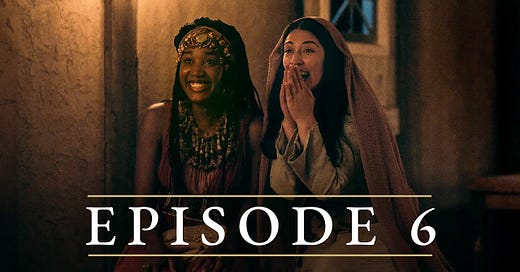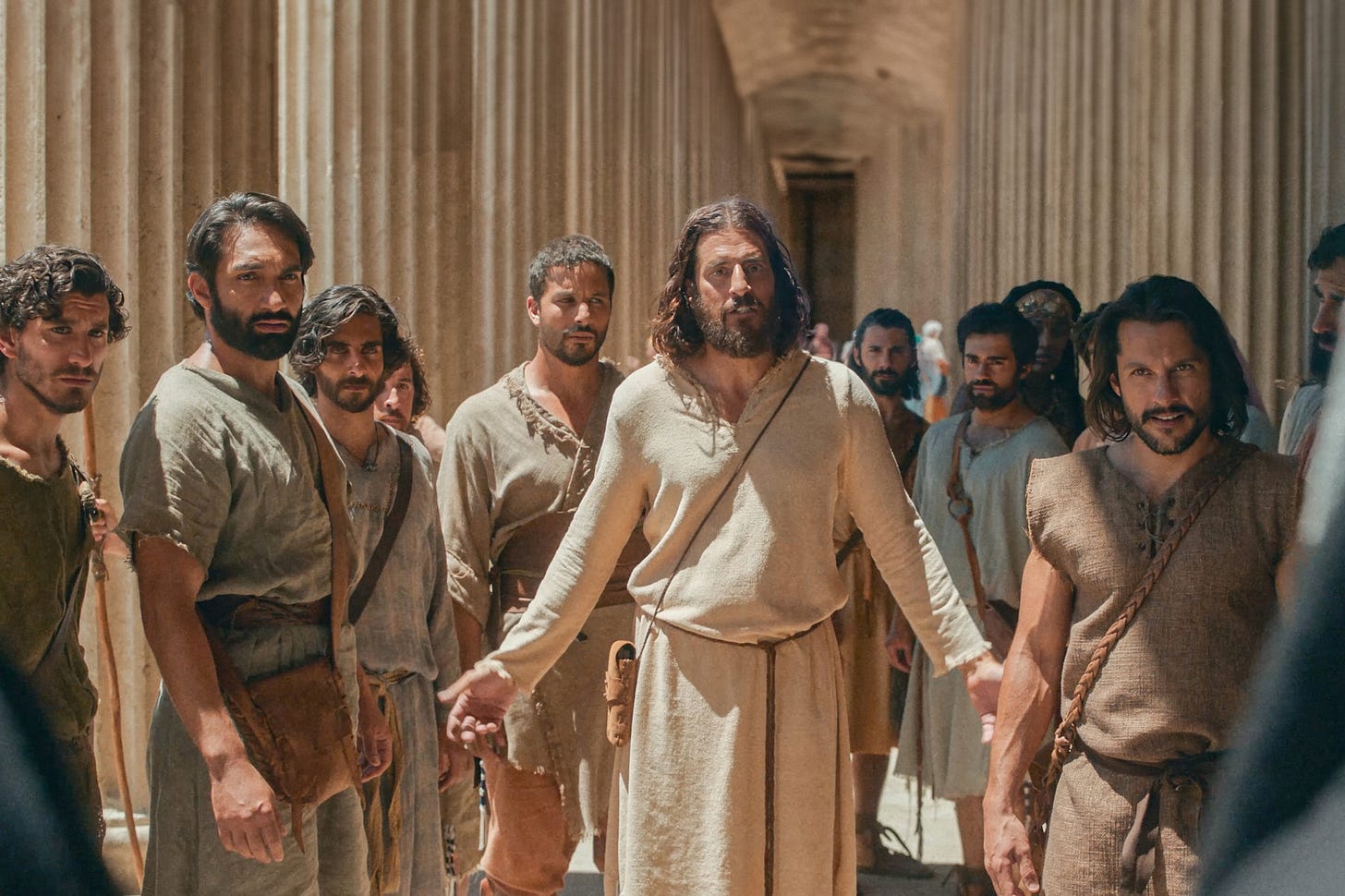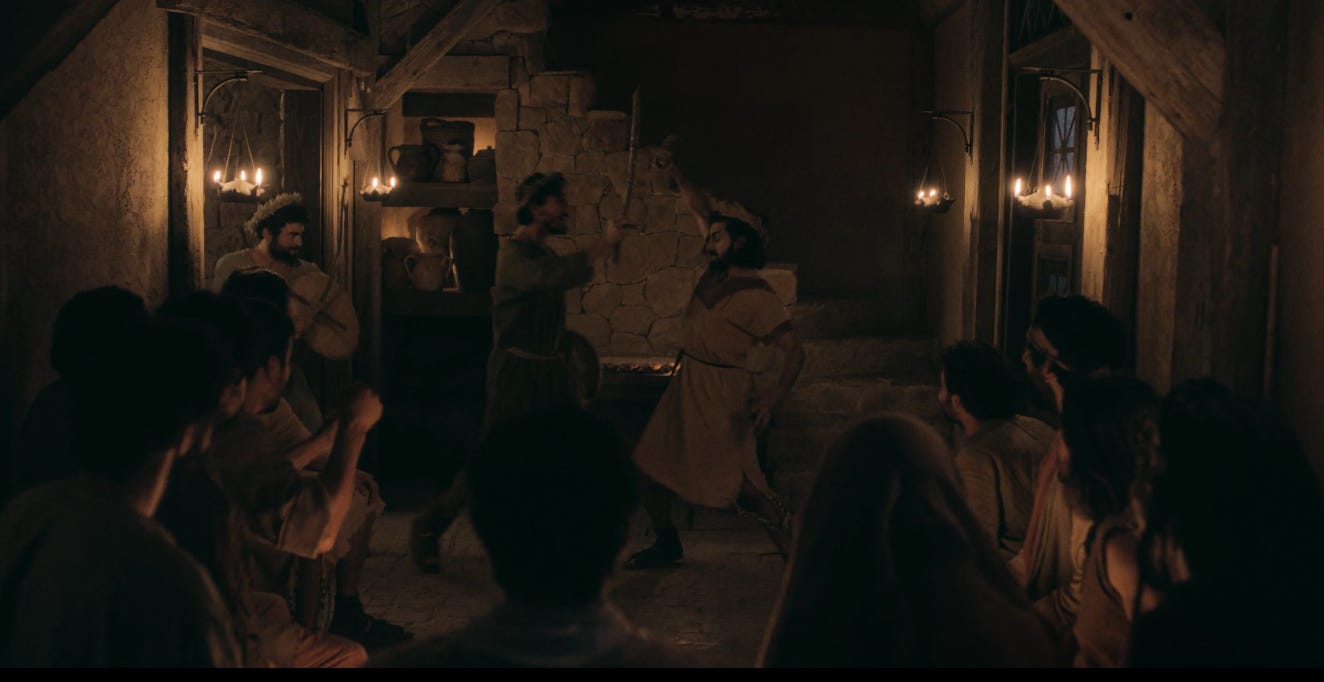Summary
Jesus and his followers celebrate the Feast of Dedication. They reenact the story of the Maccabean revolt and the rededication of the Temple, sing songs, give gifts, play games, say prayers, and light the menorah. Matthew and John tell each other how much they appreciate the other writing an account of Jesus’s ministry. Jesus tells his disciples that they will be traveling into Jerusalem so He can deliver a sermon at the Temple. Thomas, who is very clearly still grieving for Ramah, is wary of Jesus giving another sermon in front of the religious leaders.
James, John, Matthew, and Andrew decide to get Thomas new sandals more fit for traveling. Matthew notices that the funds are lower than they should be, given their expenses. He figures that Judas probably has another purse, so he goes to ask for money to pay for Thomas’ sandals. Judas tells Matthew that they cannot afford it and denies the existence of another purse. Judas becomes angry with Matthew and shows that he is anxious about not having enough money to pay for the ministry. Matthew does not accuse Judas of any wrongdoing, but he clearly knows that something is wrong. Matthew notices Judas’ annoyance when Thomas later opens his gift. Judas later tries to suggest that they start collecting donations in the towns that they go to. He wants to use the money to hire workers to support the ministry so that Jesus’s disciples can focus on spreading Jesus’s message. The group shoots him down, noting that if Jesus wanted to collect donations, he would do so. Judas approaches Jesus to tell him his idea. Judas tells Jesus that he wants to see His kingdom come, and he doesn’t want a lack of resources to stand in the way. Jesus tells Judas that He wants him to experience His kingdom too, but Jesus’s plans for His kingdom are beyond anything that Judas could dream of. Jesus tells Judas to pay close attention to His sermon in Jerusalem.
Yusuf’s father visits him in the Temple. Yusuf tells his father not to give up on him, and trust that he will always love and follow God. Yusuf’s father tells him that he is proud of him and has always been proud of him, even if he didn’t know how to show it all the time. Before his father leaves, he tells Yusuf that he will always stand beside him and support. Jairus receives a letter from Yusuf telling him of a plot to get Jesus executed. Jairus delivers this message to Zebedee, and tasks him with delivering the message to James and John.
To distract Thomas while the others go to buy his gift, Peter takes Thomas aside and inquires how he is recovering from Ramah’s death. Thomas tells him that his only relief comes from tasks that keep his mind occupied. Peter empathizes with Thomas, reminding him of Eden’s miscarriage. Peter tells Thomas that it is okay to have questions, but not okay to not accept the answers. Ultimately, Thomas is not comforted by Peter’s efforts. He does show a little bit of happiness when he receives the sandals the others bought for him.
Jesus receives a letter telling Him that Lazarus is sick. He tells the others that they do not need to go to Bethany, because it is not a sickness that leads to death. Jesus and His followers journey to Jerusalem. They arrive at the Temple steps and Jesus begins his sermon. The Pharisees and Sadducees quickly gather around and listen to Jesus’s words. They continually interrupt, question the meaning of His words, and accuse Him of blasphemy. Judas is distracted by the presence of the religious leaders, and he doesn’t pay attention to Jesus’s sermon. The members of the Sanhedrin accuse Jesus of blasphemy and begin to stone Him and His followers. In the chaos, James is struck in the head with a stone. Jesus and His disciples flee. This angers and confuses Judas, who wants Jesus to stand and fight against the Sanhedrin. They make it back to their lodging and begin to care for James as Zebedee arrives with his message. Jesus finds a letter stating that Lazarus has died from his illness. Jesus tells them that they will return to Bethany to wake Lazarus from his sleep. The disciples are confused, not knowing if Lazarus is dead or asleep. Thomas quiets them all, stating that they might as well go to see Lazarus so they can die with him. The episode ends with Zebedee delivering Yusuf’s message to James and John.
Megan’s Insight
John 10:27 My sheep hear my voice; I know them, and they follow me.
Do you hear God’s voice? I hope this passage doesn’t cause anxiety for you, but if it does, I want to take a moment to tell you that you aren’t alone. There was a significant period of time that I thought “hearing God” meant that I literally needed to hear an audible voice speaking to me in English. The word “hear” in this context does NOT mean literal hearing although there have of course been many people throughout history that have experienced this very special grace. God can speak to us in many ways.
The first and perhaps the most obvious way God speaks to us is through the Bible. His Word is living. The Bible doesn’t just tell the story of salvation, it is also a conduit through which God speaks directly to us here and now. The Bible tells us many truths about ourselves: I am saved (2 Timothy 1:9), I am complete (Colossians 2:10), I am chosen (1 Thessalonians 1:4), and many more. We should view the Bible as God’s roadmap for our lives.
In order to hear Him, we need to clear away our own roadblocks. Disbelief is the first block they may keep us from hearing God. If I don’t actually believe that I have access to the Father, it will be difficult to hear Him. Distractions and our mental clutter can also be a roadblock. We have to make space in our schedules in order to listen for His voice. There are times in our lives that we will experience spiritual warfare. The enemy wants to keep us from our Father and he has ways to confuse our minds and make us deaf to the Father’s voice. A quick prayer of protection can clear away that fog and make God’s voice clear. If we can address our mindset allowing ourselves to believe that God wants to speak to us and we can make space for Him, we will be able to open our hearts to Him growing closer in our relationship.
We have published several resources on prayer. If this is an area you would like to dive deeper check out some of these resources. Am I Praying for the "Right Thing?" Faith Building Tool Spotlight #2: Hallow
Mitchell’s Insight
How many of you have ever read the gospels where Jesus is teaching in the temple and pictured the violence depicted in this episode? I know I hadn’t. We see Jesus speaking with great passion and zeal and I think every person reading the Bible can find passages where Jesus does seem to dial things up a bit. That doesn’t always come across in all the teachings and probably doesn’t represent the most common understanding of Jesus in the culture at large. I think most people believe in the soft and cuddly Jesus. I think most people believe the infinite love for us and the examples of gentleness coalesces down to a guy that really just wants you to be well. Now, all of this, can be and is true in some sense. Jesus is gentle, slow-to-anger, and infinitely merciful. However, that is a warped understanding of the complete Jesus.
In Jesus’s teaching in the temple we find a zealous Son unafraid of the consequences of carrying out His Father’s will. The frustration and anger are not just on the face of the Jewish leaders ready to stone Jesus. It was on Jesus’s own face. The individuals charged with leading the Jewish people and preparing them for the reception of the Messiah have closed their eyes and covered their ears to the message of salvation. I encourage all of you to keep this possible reenactment of the biblical text in mind the next time you read Jesus’s words in scripture. Also remember to take that passion into your own life.
Michael’s Insight
In 171 B.C., the Greek king Antiochus IV Epiphanes deposed Jason, the High Priest of Israel, and appointed Menelaus to the position. In 168 B.C., word spread that Antiochus had been killed while fighting in Egypt, so Jason gathered a small army and stormed Jerusalem, causing Menelaus to flee. Antiochus was not dead, however, and he returned to Jerusalem. Antiochus was furious that his authority was challenged, and his choice of priest rejected, so he made a number of decisions to punish the Jews. He reinstated Menelaus as the High Priest, defiled the Temple, put out the eternal flame, and forced the priests to eat swine flesh. He outlawed Jewish rites and customs, and used the Temple as a place of worship to Zeus. These changes were heavily supported by a group of Hellenized Jews.
A group of traditionalist freedom fighters led by Judah Maccabee and his three brothers raised an army and fought against the armies of Antiochus Epiphanes for three years. Although heavily outnumbered, the Maccabees retook Jerusalem and purged the Temple of all Pagan idols as they prepared the Temple for rededication. The Jews had discovered that the oil used to light eternal flame had been defiled by the Greeks, and that it would take a week for new oil to be processed and purified. They decided to use the little amount of pure oil that they had, and light the eternal flame anyways. And through the presence of the Holy Spirit, the flame miraculously burned for eight days, until the newly purified sacred oil was ready. It would be years after the rededication of the Temple before the Jews would fully regain their independence and religious freedom, and even after it was won, they would eventually be subjugated by Rome. But the celebration of the retaking and rededication of the Temple would become an annual tradition.
At the start of this episode, we see Jesus and his followers celebrating the Festival of Dedication, also called Hanukkah (to dedicate) and The Festival of Lights. During this time, we see them taking part in many Hanukkah customs which include giving gifts, singing songs, and playing games. During this celebration it is tradition for Jews to eat oil rich foods to commemorate the sacred oil. Jesus recounts the story of Judah Maccabee and his brothers as his disciples act out the story as a play for Mary and Tamar. We also see the most important part of the celebration: the lighting of the menorah. To commemorate the miracle of the oil, one candle is lit per day for eight days using the flame from another candle meant to represent the eternal flame. The timing of this festival is significant for Jesus’s preaching in the Temple. The Temple is once again being defiled, and is in need of rededication. A rededication that Jesus is soon going to bring, but not in the way that anyone expects.
Take to Prayer
We see during Jesus’s sermon at the Temple that he is fiery and angry with the religious leaders. When reading scripture try to think of the context in which the people found themselves, and how that would have affected their demeanor and their emotional state. Understanding the emotional state that they were in at the time can give you a better understanding of the meaning of their words.
Bible Verses
Hallel Psalms - Psalm 113-118
Feast of Dedication or Hanukkah - 1 and 2 Maccabees
The basis of this episode - John 10: 22-42









